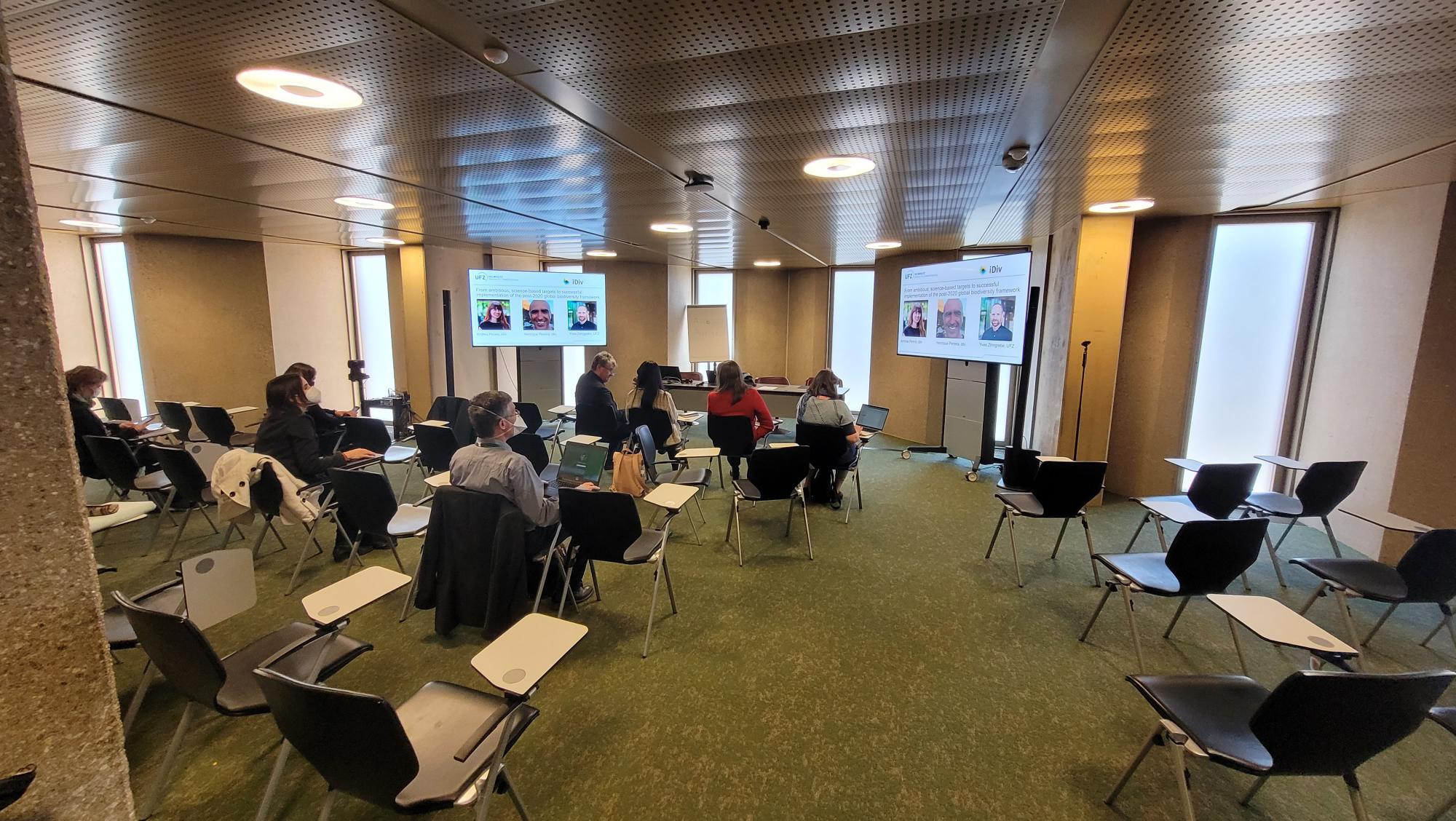- Side event -
From ambitious, science-based targets to successful implementation of the post-2020 global biodiversity framework
22nd March 13.15 h -14.45 h CET, Salle 14, Convention Centre, Genf
Host organisations:
German Centre for Integrative Biodiversity Research (iDiv) Halle – Jena – Leipzig, Germany
Helmholtz-Centre for Environmental Research (UFZ), Leipzig, Germany
Side Event at the CBD-Geneva meeting joins forces to support the implementation of the upcoming Global Biodiversity Framework (GBF)

In a collaboration between the Centre for integrated Biodiversity Research (iDIV) and the Helmholtz-Center for environmental research, we organized a side event at the current CBD-meeting (combining sessions of SBSTTA24, SBI3 & OEWG 3) in Geneva with the title: “From ambitious, science-based targets to successful implementation of the post-2020 global biodiversity framework”. Our aim was to present scientific reflections on the upcoming challenge of implementing the GBF and discuss how these insights can support the political process. The event combined three scientific inputs with a panel discussion with experts on national biodiversity strategies and accountability mechanisms. The side event was moderated by Axel Paulsch (ibn).
Based on his published article, Haigen Xu used his presentation to highlight the importance of designing the protected area network in a way that it “protects all sites of particular importance to biodiversity and its contributions to people”. He also reflected on the dynamic theory of change underlying the GBF and proposed to harness the opportunity of voluntary commitments to dynamically increase ambition.
Andrea Perino (together with Henrique Pereira) presented a publication of around 50 scientists, who identified major advances in six scientific fields: multiple values of biodiversity, remote responsibility, restoration, positive futures, multidimensional biodiversity change, and biodiversity monitoring and modeling. She argued that this multidimensional evidence base should inform iterative learning processes of identifying actions, implementing them and assessing their effects to induce ownership by different stakeholders to facilitate accountability for the implementation process.
I (Yves Zinngrebe) then presented an unpublished study on experiences with National Biodiversity Strategies and Action Plans (NBSAPs) in Peru, Indonesia, Honduras, Peru, Rwanda and Germany, collected in the project on “Trees on farms for Biodiversity” and the evaluations in Germany. The findings show that NBSAPs have different functions, including being a reference for education, a justification for projects, or a guidance for protected area management plans. There is a risk however that they are mainly produced to comply with CBD requirements. In all of the countries, experts report remaining barriers to mainstreaming and collaboration between actors and sectors.
The panel discussion reflected on several challenges and potentials for national implementation and induced a vivid exchange with the audience. Cornelia Krug (bioDISCOVERY and Universität Zürich) highlighted the need for transformative policy to address all indirect drivers. In order to engage more actors across sectors she urged to translate global targets into local language anchoring them in people’s realities. Daniela Guaras (UNEP-WCMC) emphasized the importance of a whole-of-government approach when revising and implementing NBSAPs, with a view to meaningfully engaging the key governmental agencies that should have a role in implementation. Building on experience gained through the support provided by UNDP, UNEP and UNEP-WCMC, some options that have so far helped to build a sense of greater ownership and transparency across government include adoption of the NBSAPs as policy instruments at the highest level and identifying key ministries, beyond ministries of environment, to lead on the implementation of specific targets. She emphasized that stronger coordination can foster policy coherence, which is a pre-requisite to effectively implement the framework. Sylvia Karlsson-Vinkhuyzen (Wageningen University and Research) focused on the issue of accountability and how accountability mechanisms at global and national level can be designed to support rather than constrain integration. This could be approached for example by ensuring that monitoring and indicators are focused not only on outcomes but also on inputs and behaviour, and working on a shared responsibility of all relevant actors for the GBF. She further emphasised the importance of considering trade-offs between biodiversity and others interests in participatory, democratic forward looking processes to create opportunities for learning and accountability of responsible agents.
In the final discussion, several participants highlighted the potential of synthesizing existing experiences with NBSAPs and implementation. Instead of waiting for conflicts to arise, actors should be involved early to identify solutions and jointly develop possible “best practices”. In light of the upcoming process to translate global targets into national strategies, several actors indicated interest to further exchange on how to accompany the political process with support by scientists and other actors. Please get in touch, if you feel like you want to be part of this process. We are looking forward to continuing these discussions and possibly presenting further insights in a collaborative manner along the continuously expanding road to Kunming.
Background
National Biodiversity Strategies and Action Plans (NBSAPs) are the primary instrument to translate the post-2020 global biodiversity framework (GBF) into national targets and mainstream these into all relevant plans and policies. However, CBD parties report low levels of implementation and continued biodiversity loss. Mainstreaming of biodiversity goals across different sectors has been limited, and mechanisms to enact accountability, and to monitor and report biodiversity trends are ineffective. Improved understanding of the value of biodiversity, remote responsibility for biodiversity impacts, and the complexity of biodiversity change, as well as technological and methodological advances in the fields of big data and modelling can inform the GBF and help close those implementation gaps.
Scientific advances can inform a framework for implementation of the Post-2020 goals and targets, from global to local levels and addressing all economic sectors. In this side-event, we presented an analysis of the reasons for failure of implementation of the Aichi Targets, insights on the potential scientific contributions to the implementation the Post-2020 GBF and how we can harness state of the art knowledge to inform a process of adaptive learning, and first-hand experiences on NBSAP implementations in the five countries Germany, Peru, Honduras, Rwanda and Indonesia. Based on key-informant interviews, we had reflected the use of NBSAP in their respected working reality and had extracted some lessons learned and leverage points for fostering implementation and mainstreaming.
In a subsequent fish bowl discussion, we discussed how NBSAPs can be used to mainstream national biodiversity targets across sectors, possible initiatives to address key biodiversity drivers, as well as implementation challenges and finance gaps in order to pave the way for an effective implementation of the future GBF.
| Programme | |
|---|---|
| 13.15 – 13.20 |
Welcome |
| 13.20 – 13.30 |
Ensuring effective implementation of the post-2020 global biodiversity targets Prof. Dr. Haigen Xu, Nanjing Institut für Umweltwissenschaften, Ministrium für Ökologie und Umwelt, China |
| 13.30 – 13.40 |
Biodiversity post-2020: Closing the gap between global targets and national-level implementation Prof. Dr. Henrique Miguel Pereira, Dr. Andrea Perino, Deutsches Zentrum für integrative Biodiversitätsforschung (iDiv) |
| 13.40 – 13.50 |
Mainstreaming across political sectors: Assessing biodiversity policy integration in Peru, Honduras, Germany, Rwanda and Indonesia Dr. Yves Zinngrebe, Helmholtz-Zentrum für Umweltforschung (UFZ) |
| 13.50 – 14.20 |
Panel discussion: Daniela Guarás, Senior Technical Specialist, Ökosystembewertung und Politikberatung, UNEP-WCMC Dr. Silvia Karlsson-Vinkhuyzen, Associate Professor, Wageningen University and Research Dr. Cornelia Krug, Science liaison officer Universität Zürich, Executive Officer im bioDISCOVERY Global Research Programme von Future Earth |
| 14.20 – 14.45 | Discussion with the audience |


